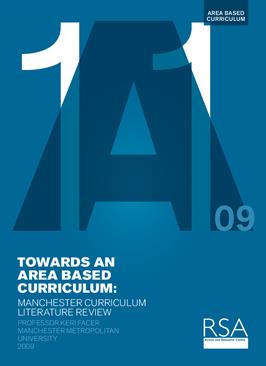A pilot project exploring this idea ran in three schools from September 2008 – July 2009, with a view to longer term development both in Manchester and, potentially, in other cities in the UK. The project was funded by Manchester City Council and managed by the RSA.
This report discusses research literature, current projects and selected historical antecedents for an area based curriculum in order to tease out the possibilities and tensions inherent in such an aspiration. In doing so it aims to prepare educators and community partners for the obstacles they might face in creating such a curriculum and to describe some of the related initiatives and research that might act as a resource for those embarking on such an endeavour.
The paper draws on research from the multiple and overlapping research fields concerned with the relationship between schools, communities and curriculum: the field of school leadership provides insights into the institutional and governance structures required to create links between diverse organisations; the field of community activism expresses the tensions in community-school relations; the field of informal education articulates the ways in which learning is always already bound up with local communities; the literature from psychology and sociology of childhood expresses the ways in which learning crosses the boundaries between school and community; the field of environmental education makes a case for a distinctive understanding of ‘place’ and human relations within communities; museum and gallery research begins to map out new relationships between the formal and informal education sectors; and social geography and ecological analyses make visible the ways in which place and community are produced and shaped by people and institutions.
The paper explores three overlapping sets of relationships through which an area-based curriculum might be developed:
-
First, it explores the relationship between teachers, students and curriculum making.
-
Second, it explores the relationships between schools and institutional partners such as other schools, public services, industry, cultural organisations and creative practitioners.
-
Finally, it explores the relationship between schools, parents and local communities.
pdf 267.9 KB
Contributors


Be the first to write a comment
Comments
Please login to post a comment or reply
Don't have an account? Click here to register.